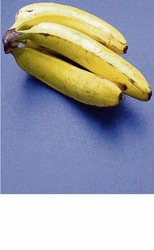
European and Latin American countries on Tuesday ended a 13-year dispute over banana tariffs in a deal that will significantly open EU markets to more imports from countries such as Ecuador.
The agreement signed by trade negotiators in Geneva would immediately lower the European Union's tariff on bananas from Latin America to €148 (US$215) from the current level €176 per tonne. It must still be formally approved by each government.
The EU's import charge would drop under the deal to just €114 a tonne by 2017, meaning millions of dollars in new opportunities for growers in Brazil, Colombia, Costa Rica, Ecuador, Guatemala, Honduras, Mexico, Nicaragua, Panama, Peru and Venezuela.
The decision will be a blow to the smaller Windward Islands, who are already finding it difficult to compete with the more productive Latam countries.
Jamaica's largest banana producer exited the export market last year, and was unmoved by the developments.
"We have made a lot of money in the banana-exporting business, but we have had our challenges as well but at the same time we are always assessing market opportunities," said Jeffrey Hall, chief executive of Jamaica Producers Group.
"JP made the decision to shift focus in banana from commodity export to value added and we are at the moment satisfied with our decision and the fact that the decision, actually reduces the preferential treatment provide some consistency with our decision."
JP had 1,300 acres of land underbananas when the last hurricane hit, and "in a good year" would export about 30,000 tonnes, Hall said.
The WTO sees the deal as a victory for multilateralism, though the conflict has taken two decades to resolve, having first emerged in 1991, based then on concerns espoused by Costa Rica.
"This has been one of the most technically complex, politically sensitive and commercially meaningful legal disputes ever brought to the WTO," said director general Pascal Lamy.
"It has also been one of the longest running sagas in the history of the post-WWII multilateral trading system."
Some of the Latam nations - supported by American fruit distributors such as Del Monte and Dole - have bitterly battled the 27-nation EU for similar preferential access as granted for producers from African and Caribbean countries, mainly former British and French colonies.
Strong presence
Chiquita sources most of its bananas from Central American countries covered in the deal. It has traditionally had a strong presence distributing in Europe.
The case was officially brought to the World Trade Organization in 1996, and the United States and Ecuador both won the right to impose trade sanctions on European goods after the WTO found the EU's rules to be illegal. Brussels has repeatedly tinkered with the import requirements in recent years, but none of the changes has withstood challenges at the WTO.
"After lengthy consultations, legal examinations, negotiations, and gentle prodding by an honest broker, a solution has been found," said a triumphant Lamy, a former EU trade chief now heading the global trade body.
"This proves there is no trade issue which lies beyond the reach of WTO members when they exhibit good will and a spirit of compromise. I hope that the same pragmatism, creativity and diplomacy will help move forward the Doha Round negotiations."
Tariff cuts
The tariff cuts will be phased in over several years to allow poorer African and Caribbean countries to adjust to steeper competition from Latin America. With the banana rules on a more even footing, the EU will compensate the former French and British colonies with nearly €200 million in aid.
Ecuador, the world's largest banana producer, could be the big winner. Its industry supports more than 1 million Ecuadoreans and the South American nation claims that the EU's latest tariff rules from 2006 was costing it about US$100 million a year in lost revenues.
Latin American bananas have around 60 per cent of the current EU banana market, while African and Caribbean producers have 20 per cent, according to EU officials. Bananas grown in the EU - mostly on Spanish and French islands - account for another 20 per cent.
Giovanni Anania, a professor at Italy's University of Calabria, predicts that the agreement will cause EU imports to move further away from its traditional suppliers, with Latin American countries capturing most of a 17 per cent surge in new exports.
The world banana trade is currently estimated at around US$8.8 billion.
- AP and Gleaner reports